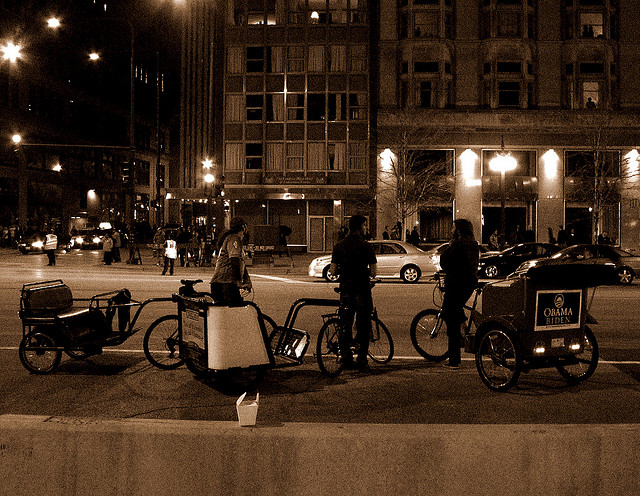Pedicab Operators Worried About Proposed New Regulations
By Chuck Sudo in News on Apr 23, 2014 9:30PM
The City Council’s Transportation and License Committees will review next week a proposal from Ald. Tom Tunney (44th) to regulate pedicabs in Chicago and some language in the legislation has owners of the bicycle taxis concerned the ordinance may regulate them out of existence, if it passes.
The ordinance, introduced by Tunney last May, would cap the number of pedicabs at 200 and require them to post fare information, follow the rules of the road and meet safety standards such as require seat belts for passengers and have proof of liability and workers' compensation insurance. But there is another caveat in the final draft being presented to the Transportation and License committees that would ban pedicabs in the Loop and on State Street and Michigan Avenue, from Congress Parkway to Oak Street, during rush hours. That’s a sizable area and, on one level, we can understand wanting to keep those streets free for other traffic. The Chicago Pedicab Association, however, sees this as a poison pill.
"This is going to potentially destroy the pedicab industry in Chicago. We won't be able to navigate the Loop and River North areas or pick up passengers in any of these areas," said board member T.C. O'Rourke.“The Loop, Michigan Avenue and State Street are the most pedestrian- and tourist-oriented areas of the city. Many pedicab operators make the bulk of their income working in these areas. They’re where the people are. Essentially, it would make working in the Loop and River North virtually impossible. We wouldn’t be able to showcase these iconic streets. The rest of the ordinance is tolerable, but not this part.”
Tunney originally drafted the ordinance because of issues with pedicabs operating unregulated around Wrigley Field. He told the Sun-Times, "We’ve been experiencing issues around Wrigley Field where we’ve got pedicabs operating without a [pre-established] fare, without a fare structure, without licensing. We feel it’s time to bring them in under the umbrella of regulation.”
Much like the food truck ordinance Tunney also sponsored, that has resulted in several mobile food vendors closing up shop rather than deal with a process they believe is stacked against them, pedicab operators feel this proposal could halt the growth of what they say is a green industry before it has a chance to grow. Robert Tipton, who operates 20 pedicabs under the banner Chicago Rickshaw, said last year fares should be negotiable and arranged before a ride starts and that there should be no limit to the number of them operating in Chicago.
“You’re just limiting the ability for people to get around,” Tipton said at the time. “Why put a limit on the under-dog when they don’t even know how many exist? What if there’s 300 citywide?”
